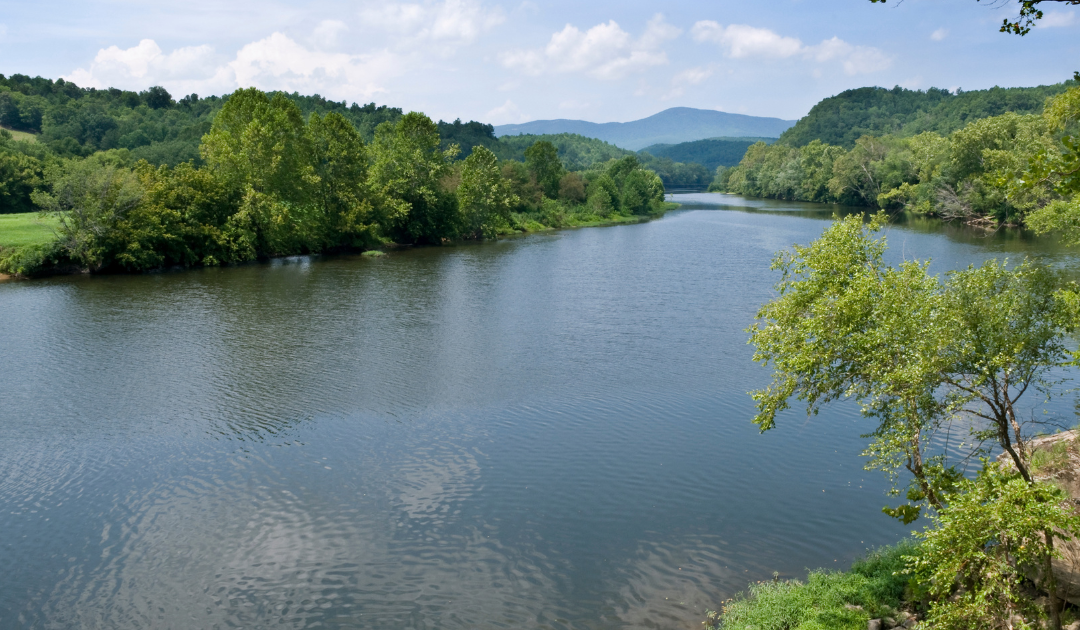by Reed Johnson, Williamsburg, VA
“You first”
A lazy summer afternoon somewhere in the late 1970s. We had finished milking cows. Ralph Lee Harris (RL) and I had ten dollars between us, and as was the ordinary afternoon growing up in Appomattox, VA, near the James River, we were off to fish. In our day, wade fishing with purple worms on a Texas rig was all you needed to harvest smallmouths of good size. The river where we fished was about a 20-minute drive through our community’s farm roads and countryside west of Stonewall off Rt. 623. A local farmer, whom we helped bail hay, allowed us to fish on his farm. Stopping at the country store along the way, we pop in for a cold beer at two dollars an eight-pack. Standing in the middle of the river, our eight packs resting comfortably on the closest rock, we would knock back those Old Milwaukee ponies, fishing.
Wading the river is for something other than barefoot. We wore shorts, tees, and old tennis shoes. One had to carefully make his way into the river and up to the rapids, where casting your line above the rapids and allowing that 6-inch wiggle worm to float into the pools below was our standard fishing technique—a little secret to the big ones. Along the shore of the James, you will find creek-like waterways that are a part of the river but separated from the river by small patches of sand bar covered with trees and other vegetation. Not more than 4-6 feet wide, but deep was ideal. Here the big ones lurk in the lazy noncurrent push of the river waiting for dinner to arrive. I was always happy to oblige them with my offering. One had to be careful; the river could be 1 foot deep or 20 feet deep with every step. Although above the Richmond fall line, I remember a rise and fall to the river. Not sure if the paper plant was to blame at the time; we knew no better, but most of the time, the tall tell sign of an approaching storm. On this day, as we carefully approach the rapids in front of us, we are approaching from downriver, looking upriver. We get out of the river, working the banks to the top side of the rapids, and back in we go. You are better off in the river walking than on the shoreline as mother nature’s poisonous creature’s sunbath and nature’s perfectly made ich scratching plants thrived.
RL and I noticed the river’s rise, black clouds in the distance, and always from the north towards the south by southeast or down the river; the storms would always come. The old farmers knew the summer thunderstorms would follow the river for miles. RL and I are in the middle of the river, looking at each nonchalantly, casting our lines, catching fish, yet the storm is getting closer. We smile; the game is on. The game is called “you first.” Now, before any of you reading this want to comment on how silly a game we played, nonetheless. The game was, who is getting out of the middle of the river first with a thunderstorm barreling down the river? Like most afternoons, we could see the storm coming from miles away; about 20 minutes later, we could hear the thunder; about 5 minutes later, we could see the lightning. The wind is blowing briskly like the fan on a farm porch blowing the playing cards off the table on a Sunday morning. Living in the rural parts of Appomattox, the routine was all too common, and on Sundays, we visited RL’s cousin, father, and Grandfather. After milking, we played “set back,” a card game on Sunday mornings.
Rain is starting to pelt us like a farmer’s saltpeter blast of a shotgun against our backsides running with sweet corn; I look at RL; he looks at me, still fishing, smiling; who will blink first? Bellowing thunder is now on top of us. I look again and can barely make out RL’s silhouette in the driving rain. The fish is on; I have put my mind to catching fish with every throw of my lure, reeling in another one. Lightning strikes the river about 300 yards down the river before the bend, another fish on, can’t go now, got to catch fish. When fishing the rapids, we throw into the current or what we call up the river, and then we turn with our lure to the down river, and a gentle pull of the bait indicates fish on. Now for smallmouth, you must be patient. You let the fish take the worm; you can follow the line in the water as the fish races out of the current to the nearest still water hole behind a rock where he intends to munch his lunch. It is then that you set the hook—a big one. I break my line on a sharp rock, and here I stand in the middle of the river, rain beating down, thunder and lightning all around now, wind hallowing without a lure on my line. I pull my farmer’s hat off my head, unhooking a floating creek chub, and tie it on. I turn, and RL is nowhere in sight. Did he leave? Did he move downriver; did he take shelter? Did he get hit? No, I thought he was ok just worked his way down to the island in the middle of the river. We had fished together for so long that we knew each other’s fishing patterns.
The first cast of the floating creek chub, right to the tip of the upriver portion of the island, produces a fish jumping high into the air. I will never forget in all my life that one fish in the late 1970s, the tender age of 19, and today at 62, one fish on the line is etched into my mind forever. Suddenly as I was reeling this 3-pound smallmouth, lightning hits not 30 feet away from me; I looked at the spot where the lightning struck, knowing the light I saw was after the bolt had hit the water; the crack of the lightning was as loud as an F16 breaking the sound barrier, the light blinding, I can’t see, the thunder comes on top of me in seconds. I looked at my line, and I looked back for RL; I looked forward. I don’t remember being afraid for some reason; fish on, I thought, so fish on…
I had fished in the rain through a mighty horrific thunderstorm, lightning everywhere, standing in the middle of the river without care. The thunderstorm came and went in about thirty minutes; looking behind me, watching the storm roll up the river, I smiled at God’s wondrous beauty. In these thirty minutes, with the barometric pressure falling rapidly, I had reeled in 15 smallmouth bass; I mean to say every cast was a fish in those thirty minutes. I had challenged God to keep me safe. I had stuck my middle finger in mother nature’s eye, failing to yield to her power. The sun comes out behind the clouds now as if nothing had happened. I would be dry from the waist up again in about forty-five minutes. Helios is starting to sink and giving way to Selene’s visit in the sky. I am looking around; RL comes out from under the trees of the main shoreline, walking out of an old, abandoned barn next to the river. RL wades into the river, he smiles, and I smile back; “you last,” he says, throwing his purple six-inch wiggly Texas rigged lure up against the island’s bank.
Reed Johnson
Author: A horse named Ray Ray

